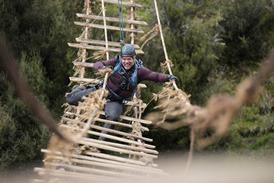A tough first six months of 2010 saw some well-established businesses sold or closed down. But things improved in the second half as commissioning picked up.
For many of the UK’s post-production players, 2010 was, to use football parlance, a game of two halves. The early part of the year saw facilities scrambling around for work, doing silly deals and generally under-cutting each other left, right and centre. And then, as summer approached, things picked up.
“We were very quiet in the first half,” acknowledges Simon Kanjee, managing director of Evolutions. “There was very little being commissioned, there was downward pressure on rates and clients were incredibly quiet. The second half was a totally different story. We were busier than we’ve ever been before, we had a record month in October and we were even subbing work out.”
Kanjee puts the improvement down, in part, to the influx of commissions being greenlit further up the food chain as confidence returned to the broadcasters.
John Rogerson, the owner of Halo Post and a 2010 RTS Craft Award winner for his sound work on Richard Hammond’s Invisible Worlds, saw something similar. “The change in levels of work compared with 2009 was the most significant improvement,” he says. “2010 has been considerably better and has seen bookings at such a level that we’ve needed to take on extra facility space to cope.”
The influx of work even helped some companies do something they have not done in many years: maintain their rates.
“In the first half of the year, clients were taking advantage of the quiet period and getting good deals,” says Kanjee. “But when demand was higher we didn’t roll over as easily on price as we had earlier in the year.”
Simon Briggs, UK managing director of Prime Focus, also saw rates remain steady, but he puts it down to the influence of new technology.
“A lot of projects we are doing now are technically very complicated in terms of fast-turnaround data workflows and new camera formats,” he says. “Clients want a safe pair of hands for this work and tend to turn to facilities with experienced staff. This allows us to reiterate the value of the company and maintain the rates.”
Mergers and acquisitions also returned to the agenda in 2010. In the biggest deal of the year, Deluxe Entertainment Services Group agreed to buy Ascent Media’s creative and media services divisions, including UK post houses Ascent 142 - which worked on First Men In The Moon - Method, Soho Film Lab and Rushes, for £9m plus, crucially, an unspecified amount of debt.
West London’s ITFC was also sold to Deluxe this year, shortly after Soho’s Pepper was snapped up by Future Film Group and just before Silk Sound was sold to Bubble TV and its owner Chris Phinikas.
“The industry has gone through a very rough time but this deal shows that there is some positive activity around,” says Phinikas.
Takeover targets
Evolutions and Prime Focus also held takeover talks. It was a story that had Soho captivated for several weeks but, in the end, negotiations came to nothing. Undeterred, the latter, in particular, is still looking for new partners.
“We’re always looking at acquisitions,” says Briggs. “And in these challenging financial times, there are always companies looking to change their business models.”
Rogerson, who bought Spirit Studios in 2009, says: “Acquisition opportunities remain strong. But the choice of target requires a huge amount of forward planning in terms of what shape your company ends up in and your positioning in the industry.”
While talk of Soho buyouts caught the eye in 2010, probably the biggest facilities story of the year began 150 miles away in Wales. In 2009, Barcud Derwen Group was one of the country’s biggest facilities providers, turning over £14.3m and making gross profits of £3.7m. By the middle of 2010, however, it had closed, leaving behind a long list of creditors and debts of more than £1.8m.
The collapse affected a host of facilities including Barcud Derwen, Derwen, Arc Facilities, Awen, Eclipse Creative and 422 South. The rot is said to have started with the demise of Dublin’s The Farm, a facility that was bought for £2m back in 2005 and subsequently sold for 1 last year.
Barcud Derwen shareholder Iwan Edgar says the original plan had been to sustain and reinforce Wales with money from Ireland, Scotland and England but, in the end, it had the opposite impact.
“I think it was this policy that pushed the company over the edge,” he explains. “The board didn’t concentrate on its creation, Barcud Derwen. It became a monster without direction or purpose.”
The downward spiral was swift. In May, it lost the contract to broadcast live proceedings from the Welsh National Assembly, which it had held for 10 years.
Days later, the directors concluded that the company could not trade through its “cash-flow difficulties” and put it up for sale. By 15 June, 30 people were made redundant as the group entered administration. Within a week, it was decided that all of the businesses within the group, with the exception of outside broadcast company Omni, would close.
The impact on the Welsh television production sector was severe, with a total of 110 people losing their jobs. Speaking at the time, business recovery firm Grant Thornton stated: “The joint administrators made concerted efforts, alongside the company’s directors, to achieve a going-concern sale of the business and assets of its companies. Regrettably, this has not been possible.”
There were survivors, though. Bristol graphics firm 422 South was resurrected by Parthenon, the parent of production company and distributor Parthenon Entertainment, which agreed to provide financial backing for a new limited company.
Arc Facilities in Glasgow was also handed a lifeline when Creative and Technical Media Services (CTMS), the owner of Manchester’s 422.tv, snapped up the company’s assets, saving a host of jobs in the process.
“Arc is a good business with an excellent reputation and a talented team,” says CTMS managing director David Jackson, who placed orders for new kit for the company towards the end of 2010. “It has been through the mill a bit but with this investment I expect it to thrive.”
Further casualties
While Barcud Derwen was the highest-profile casualty of 2010, it was not alone. Another victim was Manchester’s Hullabaloo Studios. The company was wound up in October, with eight people losing their jobs, despite an RTS North West Craft Award nomination and an agreement to post-produce Raa Raa The Noisy Lion, a new animated show for CBeebies.
Although a new incarnation of Hullabaloo - Factory Transmedia - is in the pipeline, the company’s demise is symptomatic of a malaise in TV’s second city in 2010. Despite the imminent arrival of BBC North and MediaCityUK, several Manchester companies struggled, including Red Vision, which eventually closed its studios division, a move that put 35 people out of work.
“Regular delays in making commissioning decisions meant we couldn’t sustain a huge number of staff any more,” says managing director and co-owner Dave Mousley, who has instead adopted a freelancer-based business model. “There is lots of work out there but it never comes when you want it to.”
Andy Sumner, managing director and owner of Sumners, the city’s largest post house, describes 2010 as brutal. “It’s been a tough couple of years,” he says. “The green shoots seem to be there for next year though. It feels a lot more exciting than it did 12 months ago.”
Sumners had to tighten its belt in the summer, putting some staff on shorter working weeks. “Nobody is immune from the recession,” he says.
“We work on a nine-month lead time so when the shit hit the fan, the commissions were still in place. Once they’d been delivered, though, it suddenly became much quieter. You can’t put your finger on why but the phone isn’t ringing as much. You clench your buttocks and make the savings you can. Fortunately, the back end of the year has been very busy.”
Which brings us back neatly to that year of two halves. While 2010 was devastating for some, the success of the past six months has breathed life back into the sector. It’s a funny old game.
POST-PRODUCTION 2010
January
- The Farm Group spends £1m upgrading the audio studios at its Home facility
- Former Soho post bosses David Brady and Dan Gable team up to launch training company The Bridge
February
- BlueBolt appoints former MPC managing director David Jeffers as its non-executive chairman
March
- Post bosses take part in fi lm and TV trade mission to the United Arab Emirates
- UK Screen’s Sector Report claims the facilities market (including post-production) is worth £2.2bn
April
- Post bosses are among Brits stranded abroad because of the Icelandic volcanic ash cloud
- Red Vision closes its studios division
- BBC Studios and Post Production makes 44 staff redundant
May
- Barcud Derwen Group put up for sale
- Former Rocket Post staff take their ex-employers to an employment tribunal
- Prime Focus reinstates the full salaries of UK staff who took pay cuts
June
- Barcud Derwen placed under control of administrators
- Staff at The Club are left jobless as capital investment firm completes assets-only deal for the Covent Garden post house
July
- West London’s ITFC put up for sale
- Creative and Technical Media Services buys Barcud Derwen Group’s Arc Facilities
August
- Planned BBC S&PP strike over travel expenses for EastEnders staff called off
- Soho mourns the loss of Andrew Christie, ‘the Godfather of post production’
- Future Film acquires Pepper
September
- Evolutions and Prime Focus end merger talks
- ITFC sold to Deluxe Entertainment Services Group
October
- Bubble TV buys Silk Sound
- Prime Focus London shares suspended
- Hullabaloo Studios closes
November
- Deluxe to buy Ascent Media’s creative and media services divisions
- SIS and Peel Media secure deal to provide studios, post and technical services at MediaCityUK
December
- BBC S&PP to axe 123 jobs
- Clear Cut Pictures, Envy, Films@59, Halo, Molinare and Prime Focus nominated for Broadcast Post House of the Year


























No comments yet